Compiled by Noor Alwali, Global Ties U.S. CDAF Intern and Angela Zheng, Program Associate, Strategic Communications
The Citizen Diplomacy Action Fund provides small grants to teams of U.S. government-sponsored exchange program alumni (ExchangeAlumni) to carry out public service projects using the skills, knowledge, and networks gained during their exchange experience. This June, we’re highlighting two CDAF projects that used comic books as a storytelling medium to empower individuals to share their voices in their local and global communities.
Meet Ram Devineni, an alumni of the American Arts Incubator Program, who led the 2022 CDAF project “Resilience Augmented Comic Book and Street Art Workshops in Bogota, Colombia,” and Leorian Ricardo, an alumni of the Young Leaders of the Americas Initiative (YLAI), who led the 2023 CDAF project, “Be the Superhero of Your Own Story / Sé el Superhéroe de tu Propia Historia.” We spoke with both teams about storytelling, community-building, and why exchange matters.
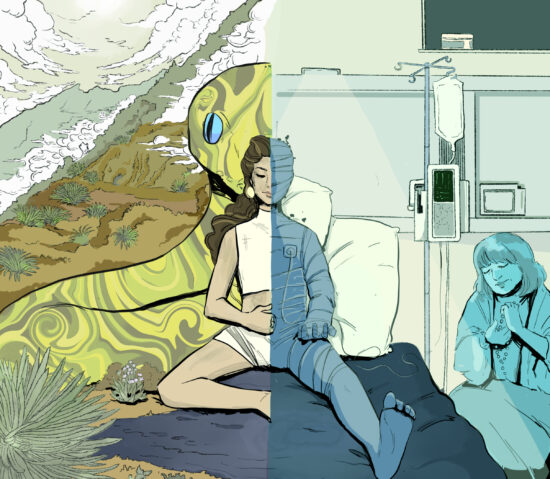
Panel from the Kaia comic book, introducing the background of the protagonist. All visuals from their respective CDAF teams.
Tell us a little about yourselves and your CDAF project. What’s your relationship with comics and storytelling, and what inspired you to pursue your CDAF project?
Ram: My name is Ram Devineni. I am a documentary filmmaker based in New York City. I am also the creator of India’s first female comic book superhero – Priya. She is a rape survivor who rides a flying tiger fighting against gender-based violence to create empathy for survivors and challenge patriarchal views. The series has over 26 million readers worldwide and 1,000 new stories, and was named “gender equality champion” by UN Women. Priya’s story became a powerful voice in the global movement for women’s rights, a symbol of solidarity against gender-based violence.
With the CDAF grant, my team created another female superhero in Colombia based on the life of Natalia Ponce de Leon, an acid attack survivor and advocate. This comic book, “Kaia,” used a similar style, but was very specific to the Colombian and Latin American context, and I think that is why it resonated so well. The grant allowed us to bring the series to children all over Bogota and run art workshops with NGOs based in Bogota. We also painted several augmented reality murals and partnered with the U.S. Embassy in Bogota.
Leorian: My name is Leorian Ricardo. I am co-founder and current president of Moro Studio, the first professional illustration and comic creation company in the Dominican Republic. We have more than 10 years of experience growing the Dominican comics industry and developing opportunities so that young talents can have a stable career as illustrators.
My project provided narrative and comic drawing workshops for students of Latin origin in Minnesota to create their own mini comics with legends, stories, or experiences from their countries of origin. I had the pleasure of going to Minnesota for my Young Leaders of the Americas Initiative (YLAI) fellowship, where I taught a small workshop at the Minneapolis College of Arts and Design (MCAD), and I was delighted with the great community and talent of comic creators. It caught my attention that no talents of Latin origins were present, so I wanted to contribute what I could to help change that situation.
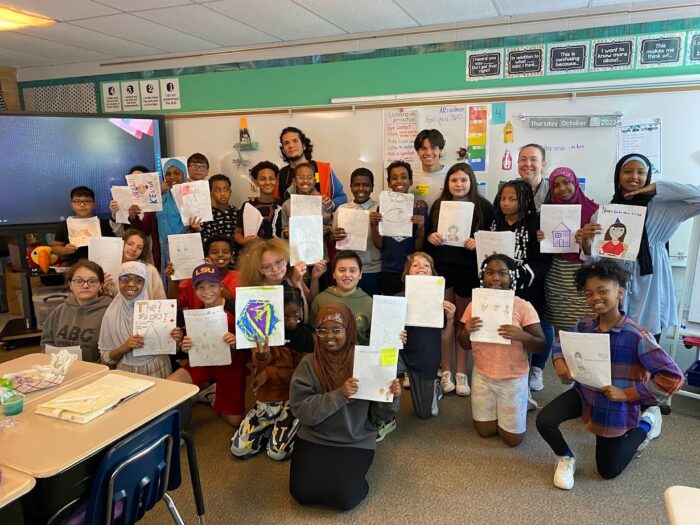
Leorian (back row, left) leads a comic workshop at Gideon Pond Elementary with fellow ExchangeAlumni and assistant Marcos (back row, middle).
How did your exchange experience(s) help shape your CDAF project?
Ram: I enjoy traveling and exploring new cultures. Every program that I was involved in led me to create something new. My exchange to Durban, South Africa through the American Arts Incubator Program, led me to learn more about apartheid, which, in turn, had me learn about slavery and segregation in America. Based on this experience, I produced an interactive comic book called “Jupiter Invincible” about an enslaved African American who is given the power of invincibility.
As an artist and storyteller, I love meeting my peers in different countries and cultures. We face the same dilemmas and struggles with our work and making them relevant to audiences.
The CDAF small grant opportunities are an ideal opportunity to give back to the communities I have worked with and share my expertise with other artists and community leaders. Although it’s called a small grant, I do not see it as a small grant because these funds can go a long way and have a major impact on a small organization, or a remote village, or urban school. They also can be leveraged with other local grants to have a bigger impact.
Leorian: My exchange experiences were vital not only for my CDAF project, but for my growth as a professional and as an individual. Being able to broaden my horizons and live first-hand the experience that communities of storytellers can have, really left me with the desire to contribute what I can from my own experiences and knowledge to the development of those talents, while creating bridges to support the growth of talented artists from the Dominican Republic.
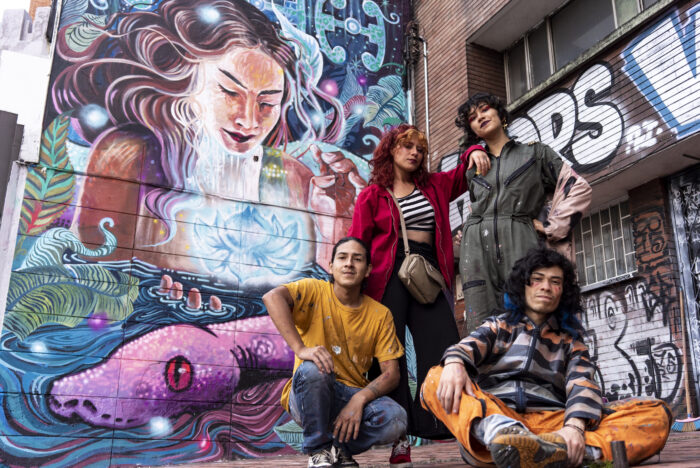
Street artists pose in front of a Kaia mural in Bogota.
What role do you think comics play in building community?
Ram: Although the process of drawing comics can be very solitary, the process of developing stories is very communal. I create comics that are socially driven, fuse my interests in documentary filmmaking and art, and engage many different people: survivors, activists, educators, philosophers, and other audiences. This is where community is built and brings together many disparate people to tackle complex issues. Comic books help bring awareness, but people make change.
Leorian: As someone who helped create an illustration company thanks to the talent of his own comic book fan friends from college, I can assure you that that a bond is created between readers of sequential art. This begins as just a hobby, but over time (and some debates on Hulk vs. Superman), a respect and desire to be able to communicate your own experiences through the rich language of the ninth art [comics] is created.
In general, fans of cartoons have a moral sense of fighting for what is right that comes from years of seeing these super heroic characters, which shapes your entrepreneurial spirit to try to change what you consider is not right. This is reinforced by cliques, by labeling as “weird” or unsocial. When you meet a geek colleague and realize that you are not alone, it’s empowering and builds confidence that reinforces creative self-esteem.
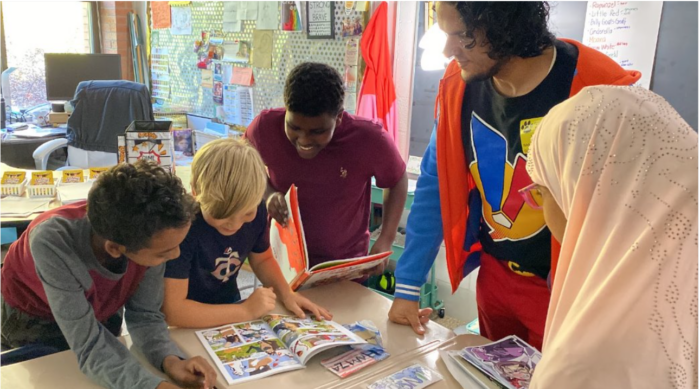
Leorian (second from right) discusses comics with students during a workshop.
Let’s talk about the writing and character development process. How can comics help redefine superheroes and / or raise awareness about diverse topics and identities?
Ram: When I was in high school, I read Joseph Campbells’ work on mythology and the universal stories that connect us together all over the world. I think comics are a way for artists and storytellers to create new myths and ideas around globalization. That is why I created Priya and helped to launch female superheroes in Colombia and China. Superheroes are the modern gods, heroes, and villains. Comic books, especially superhero comics, are an American innovation, and an ideal way to share democratic values with other cultures.
During the height of the COVID-19 pandemic in India, I applied for a grant through the U.S. Embassy in New Delhi to develop a project to educate young people in Northern India about the pandemic. I created a short animated film and comic book focused on the misinformation surrounding the pandemic and its disproportional impact on women in India, especially frontline medical workers. We were able to get some major Indian and Bollywood actresses, including Vidya Balan and Murnal Thakur, to lend their voices. The project went viral, reaching millions of people around the world, and has been translated into a dozen languages. This is a perfect example of cooperation between U.S. and Indian artists coming together to tackle a big problem.
Leorian: I strongly believe that comics have the power to inspire generations with their stories and characters that often transcend other pop culture mediums. I consider myself a result of these fantastic stories, where I learned values such as the importance of not giving up, the strength of being a good person, and the unbreakable human spirit in the face of adversity. When you create a character, you are not just adding letters to move the story forward, you are developing a medium to share experiences, whether your own or of those you know.
It is not uncommon for an author to be inspired by a historical figure or their personal life and give voice in a unique way to an event that perhaps is not being talked about enough. An example is the X-Men series. With the adjective “mutants,” they [X-Men] represent anyone, anywhere, who feels like they are being targeted for being different. This applies to social movements and oppressed communities based on how they identify or with whom they want to share their life.
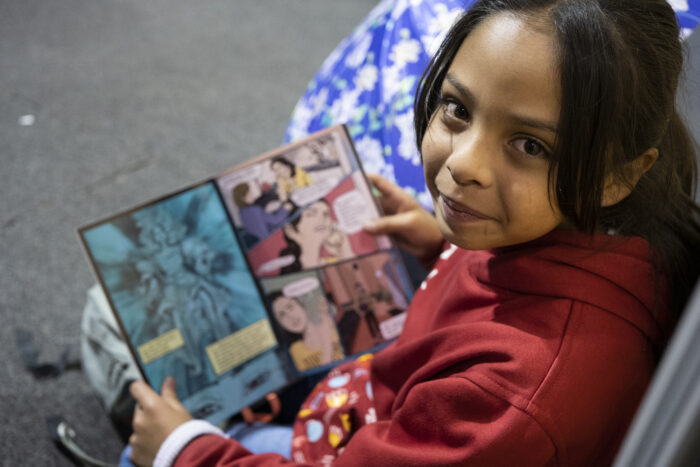
A girl in Bogota reads a Kaia comic
Any final advice or words of wisdom you’d like to provide for emerging comic book artists or ExchangeAlumni seeing to facilitate positive change in their communities?
Ram: I don’t think you can throw a dart on a map and say that is the country I want to travel to and do an exchange. I think you need to commit to a country and culture early and learn as much as possible before you go there. Obviously there should be a sense of adventure, but it’s important that you know what you can contribute back to the community. And always return. Don’t let this exchange be just a cherished memory – make it a commitment in your life. Using comics to educate people about social issues is an excellent way to explore different cultures because it is relatively inexpensive and has a high impact. All you really need is paper and pencils, and a whole lot of imagination.
Leorian: In this great and infinite multiverse that we live in, there is nothing that brings more joy (except maybe pizza with passion fruit juice) than sharing what you are passionate about with someone else. Tell stories that are important to you or that you think are not being discussed enough. Learn from the great authors who, decade after decade, have left their mark with their works (Jack Kirby, Art Spilgeman, Alan Moore, Neil Gaiman, Akira Toriyama, etc.). Don’t be afraid to have fun while creating your own story, since in the end, if you as an author are not convinced by what you say, do not expect others to be convinced either. Keep believing and creating, my fellow storytelling geeks!
